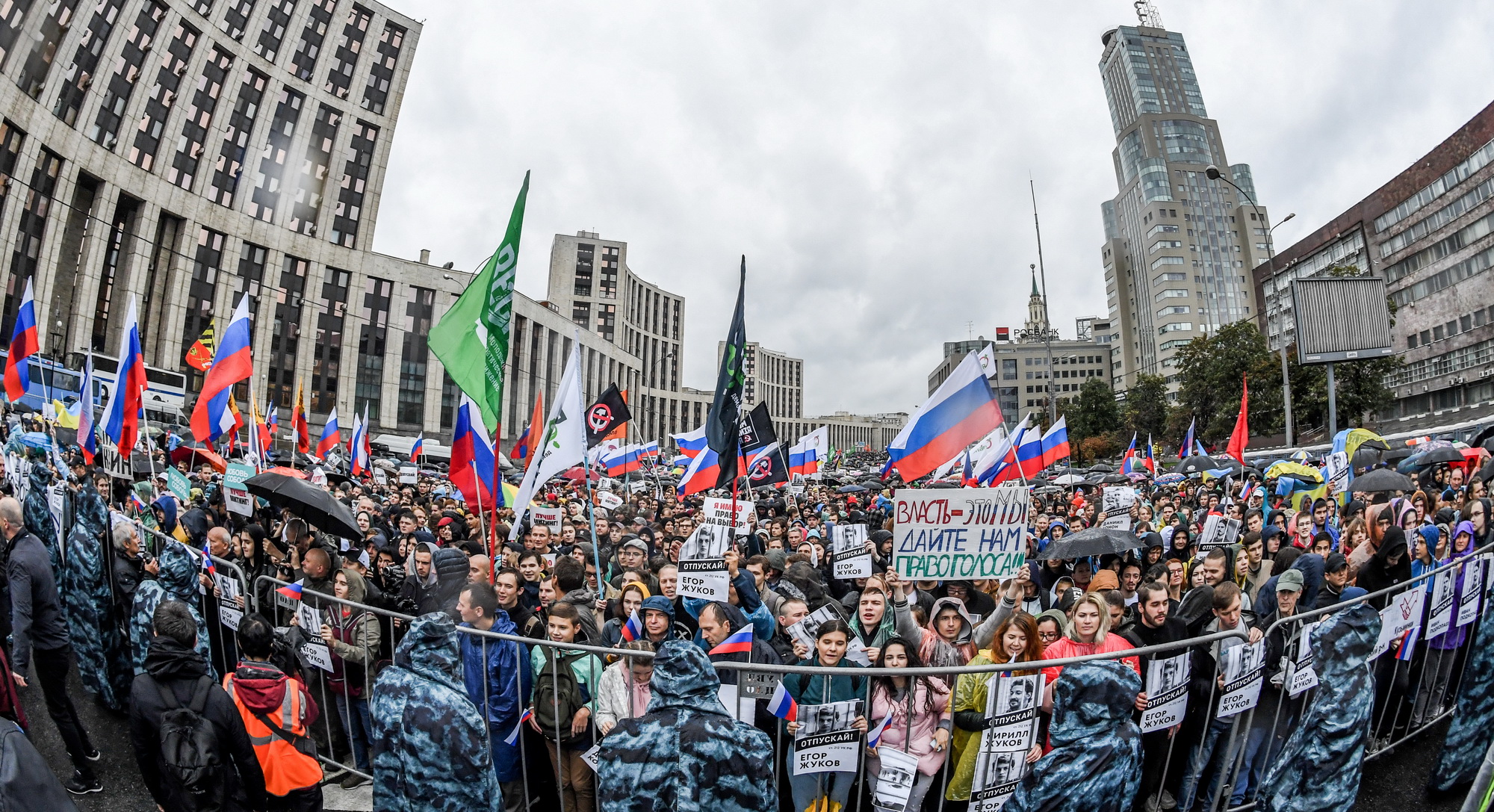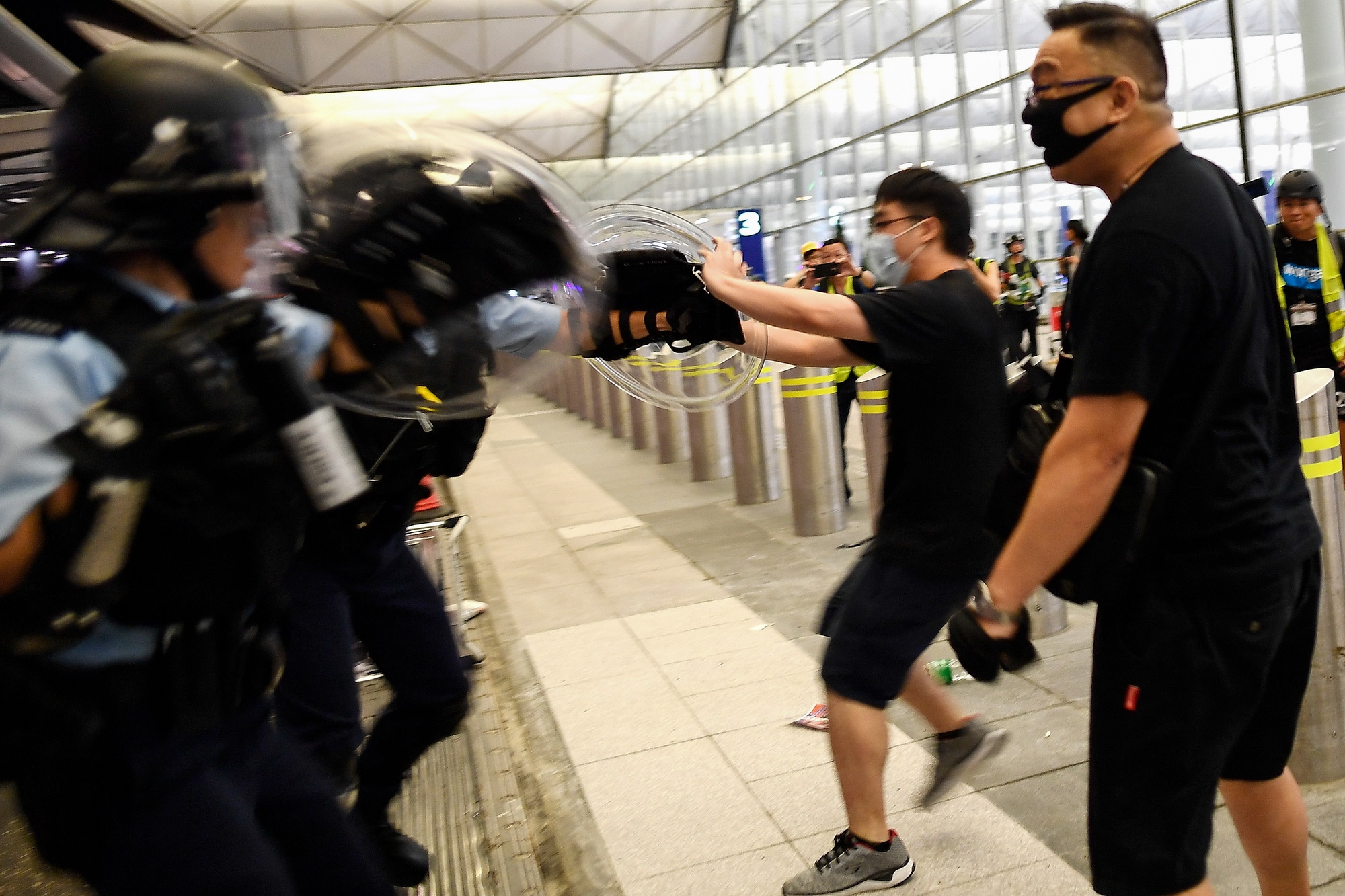Over the past several weeks, massive protests have shaken two parts of the world far away from each other: Moscow and Hong Kong.
While more than 7,000 kilometers separate the two cities with combined populations of 20 million people, the universal human desire for freedom and democracy unites both protests.
This is a cause with which Ukrainians are intimately familiar.
Ukrainians have already had two successful revolutions this century, the first to stop Viktor Yanukovych from stealing a presidential election in 2004 and the second to remove him from power in 2014. In both popular uprisings — known as the Orange Revolution and the EuroMaidan Revolution, respectively — Yanukovych was defeated. Now, he is living in exile in Russia.
The struggle for democracy will be much harder in Moscow and Hong Kong.
Russian dictator Vladimir Putin has ruled his country with an iron fist since 1999.
Chinese President Xi Jinping has been in power since 2012 and is now allowed to rule the country for the rest of his life.
The Moscow protests are the largest since the 2011–2012 protest movement against rigged parliamentary and presidential elections. The current protesters have been demonstrating against the election commissions’ refusal to register opposition candidates for Moscow’s city council elections on Sept. 8.
The Hong Kong demonstrations appear to be the biggest in the former British Colony’s history. They were triggered by a bill that would allow the Hong Kong authorities to extradite prisoners, including political ones, to mainland China, where the court system is under total Communist Party control.
The likelihood of a successful revolution à la EuroMaidan in either Hong Kong or Moscow is smaller than in Ukraine because the protesters there face far more powerful regimes than that of Yanukovych, the Ukrainian president from 2010–2014.
However, both protest movements have the potential to change the future of Russia and China — something many Ukrainians realize.
“We must support Moscow protesters by all means,” Vladyslav Olenchenko, a co-founder of Ukraine’s Nova Kraina (New Country) think tank and an ex-leader of the Democratic Alliance liberal party, wrote on Facebook. “…I wish the Moscow demonstrators a victory over the Kremlin regime this fall. Don’t give up!”
No opposition allowed
To register for the Moscow city council elections, candidates were supposed to collect signatures from at least 3 percent of a district’s voters.
However, election commissions routinely rejected signatures collected by opposition candidates, claiming that they were fake, contained misprints or did not comply with regulations.
Civil society organizations blasted these rejections as aimed at eliminating opposition candidates. In many cases, people whose signatures were rejected confirmed that they had given them.
Russian columnist and writer Yulia Latynina believes that the opposition candidates had a solid chance of winning if they had been allowed to run.
Once on the city council, even if in the minority, they could have used their positions to call attention to corruption, Russian human rights activist and political analyst Georgy Satarov told the Kyiv Post.
The opposition won in 32 out of Moscow’s 125 districts in the 2017 district council elections, giving them influence in much of central Moscow.
Biggest in a decade
Muscovites have held regular protests against the election commissions’ decisions in Moscow every week — specifically, on July 20, July 27 and Aug. 3. Each time, the demonstrations attracted between 10,000 and 20,000 people.
Then, on Aug. 10, they held a rally that drew at least 50,000 people, making it the largest protest since 2011, according to White Counter, an independent group that monitors the number of protesters. The turnout was impressive, given that it happened during summer vacation season and that the cause was just a local election.
Thousands of protesters have been arrested at the rallies. The largest number was on July 27, when 1,388 demonstrators were detained.
The police have cracked down on protesters and beaten many of them. Police officers have been filmed striking a woman in the stomach and manhandling a protester with cerebral palsy and have taken away insulin from a demonstrator with diabetes. Moreover, the police have searched and raided opposition leader Alexei Navalny’s Anti-Corruption Foundation several times.
Navalny and major opposition candidates for the city council — Kostantin Yankauskas, Ivan Zhdanov, Ilya Yashin, Dmitry Gudkov, Lyubov Sobol and Yulia Galyamina — have been arrested several times for terms of up to 30 days, and several of them are still in custody.
Moreover, 14 protesters have been arrested as part of a criminal case into alleged riots and face prison terms. The accusations of “rioting” have met broad skepticism because the protesters were peaceful and did not throw rocks or Molotov cocktails at the police.
Discredited officials
As the protests developed, Navalny’s Anti-Corruption Foundation uncovered the luxury properties of several officials involved in the city council election.
For example, companies owned by relatives of Moscow Deputy Mayor Natalia Sergunina, who is responsible for the election, have received lucrative real estate at below-market prices from Moscow City Hall.
The family of Valentin Gorbunov, head of the Moscow city election commission, owns a 900-square-meter house near Moscow and a 200-square-meter luxury estate on the Adriatic coast in Croatia. Gorbunov has been an election official in Moscow since the Brezhnev period in the 1970s and has headed the Moscow city election commission since 1994.
Boris Ebzeyev, a member of the Central Election Commission, is also controversial. His grandson Artur acquired a 274 square meter apartment with an estimated value of 500 million rubles ($7.5 million) when he was four years old.
The officials did not respond to requests for comment.

About 50,000 protesters attend a rally in central Moscow on Aug. 10, 2019, against the authorities’ refusal to register opposition candidates in the Sept. 8 Moscow city council election. The demonstration was the largest in Russia since the 2011-2012 protests against rigged parliamentary and presidential elections. (AFP)
Causes of protests
Apart from the Moscow election, the protests have been motivated by anger over pervasive corruption and escalating political repression, as well as a major generational shift, Satarov argued.
Latynina argued that major protests in history, including the Arab Spring, have been caused by a growing young population dissatisfied with the status quo.
Navalny has been able to attract thousands of younger protesters, including high school and college students who have never before attended protests.
Another reason for the growing protest mood is the declining economic situation amid long-standing Western sanctions.
Moreover, Putin’s decision in 2018 to increase the retirement age also triggered major protests.
As a result of these and other factors, in early August Putin’s approval rating hit its lowest point since 2001: 43 percent, according to FOM, a Kremlin-friendly opinion polling agency. Another Kremlin-linked polling agency, VTsIOM, stopped publishing weekly approval ratings for Putin and other politicians at the same time, switching to a monthly format.
Russia’s future
Analysts, including Satarov, argue that the Kremlin is unlikely to make any real concessions to the opposition in the run-up to the city council election. So far, only one symbolic concession has been made: Sergei Mitrokhin from the opposition Yabloko party was registered as a candidate on Aug. 14. However, Yabloko and Mitrokhin have faced accusations of being de facto controlled by the Kremlin. They deny that.
The protests come at an inconvenient time for Putin, who needs to solve the problem of staying in power after his fourth term expires in 2024. The Russian Constitution forbids another consecutive presidential term for him.
Putin is widely expected to remain Russia’s de facto ruler after 2024 — by removing term limits or becoming the prime minister, speaker of parliament or president of a united state of Russia and Belarus.
The protest movement may influence the 2021 parliamentary election and the 2024 presidential election, creating potential obstacles for Putin, Satarov said.
Latynina said that the protests will be successful if they manage to split the political elite.
Chess grandmaster and opposition politician Garry Kasparov argued on Twitter that the Aug. 10 protest was a “reminder that Putin, like every dictator, has no idea when or how his rule will end” and that “it will be sudden.”
However, as the regime becomes more unpopular, it is expected to become more repressive and rely more on brute force than on popular support, according to Latynina.
Ilya Ponomarev, a former member of Russia’s State Duma now exiled in Ukraine, told the Kyiv Post that Putin is not afraid of the protests for fair elections in Moscow.
“For him, they are just a bunch of intelligentsia. He’s afraid of the broad masses that are more pre-occupied with economic concerns (than political ones),” he said.
The Russian protest movement is unlikely to lead to a EuroMaidan-style revolution because Putin’s regime is much stronger and more authoritarian than any government that has ever ruled Ukraine, analysts say. Putin has at his disposal the newly-created, 340,000-strong National Guard of Russia, which carries out both riot police and national guard functions and is capable of nipping any protests in the bud.
Putin also has another trump card: he has previously used wars and invasions to mobilize popular support and neutralize protests, according to Dmitry Oreshkin and other Russian analysts. This includes Russia’s annexation of Crimea and invasion of Ukraine in 2014. Putin’s critics fear that he may decide to escalate his war against Ukraine.

Police scuffle with pro-democracy protesters at Hong Kong’s International Airport on Aug. 13, 2019. (AFP)
Hong Kong revolution?
The Hong Kong protests, which started in March, have been more massive and more violent than the Moscow ones.
Between 240,000 and 1 million took to the streets on June 9, and between 338,000 and 2 million demonstrated on June 16.
Moreover, the protesters have clashed with police many times. They seized the building of Hong Kong’s legislature on July 1 before being driven out by the police.
The demonstrators also blocked Hong Kong’s main roads and brought the city to a standstill on Aug. 5. Next, they occupied Hong Kong’s airport on Aug. 9.
Unlike the Moscow protesters, the Hong Kong ones have succeeded in achieving their main goal: the extradition bill has been suspended.
Now the protesters are also demanding the complete withdrawal of the bill, the resignation of Hong Kong Chief Executive Carrie Lam and universal suffrage.
However, China may retaliate against Hong Kong, repeating the massacre of thousands of protesters during the 1989 Tianamen Square protests in Beijing. The Communist regime has recently deployed troops near the border with Hong Kong.
If China crushes the Hong Kong protests, that will be bad not just for the demonstrators, but also for the whole world. Analysts argue that this may have a disastrous effect on the Hong Kong and Chinese economies and, as a result, also on the global one.
